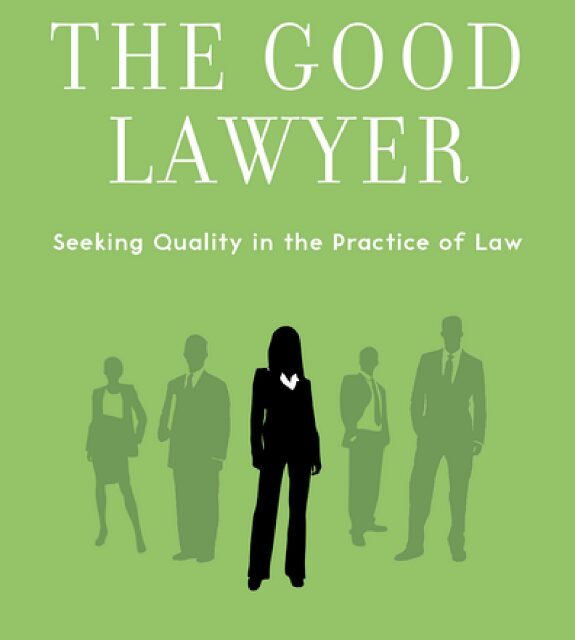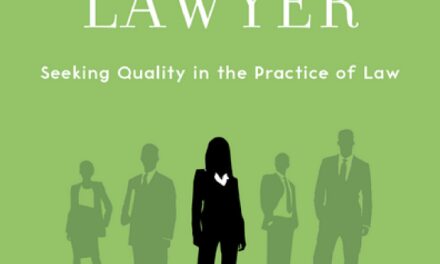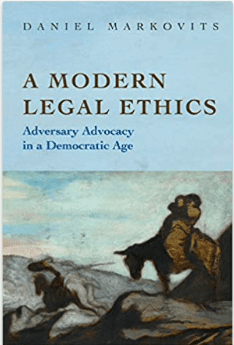Douglas O. Linder & Nancy Levit. THE GOOD LAWYER: Seeking Quality in the Practice of Law. Oxford University Press, 2014, with an enormous bibliography to be found in the footnotes. My exposition, commentary and critique will be presented in several
parts. This one is on background and foundations.
Realism
This is Part VI. Part I should be read first. It pertained to foundations, topics, and most important sources. Other parts which concern other specific matters will be organized by questions about, commentaries on, and therefore arguments with different chapters. Part II, already published, is about Chapter One of the book, and that chapter was about the good lawyer, empathy, and the good lawyers’ being empathetic. This one, Part III, is about Chapter Two, and it is about courage, being courageous, and being a good lawyer. Part IV is about willpower, and it is closely connected to Part III by reason of the fact that courage and willpower go together naturally. (Of course, willpower is connected to everything lawyers do, for no consistently good lawyer can be lazy and weak when it comes to devotion to get the relevant work done, even the authors do not actually say this.)
This Part, VI, is about Chapter 6 of the book, and it is entitled, “The Good Lawyer Thinks Realistically about the Future. Therefore, realism in the sense of realistic thinking, is deeply embedded in the minds of all good lawyers.
This is an outstanding chapter in the book. Remember! My discussions are not meant to tear at the spirit of the Linder-Levit treatise. As I have said repeatedly, it is a kind of written philosophical, Socratic dialogue. That’s why I mostly ask questions.
The central idea is that people need to get realistic about their own performances and all good lawyers actually do it. Now, think about what the term “realism” means in this chapter. Hint: it is not the way the terms are used in aesthetic discourse.Question: Does that matter in understanding what is being suggested here? As implausible as it may sound, I think so.
Still, why should the realism of the sound thinking of lawyers be tied to the future?
Shouldn’t it also tie to the past? Of course, understanding the past now is like treating it as if it were the future since it is new to the person trying to come to an understanding, is it not? Or is it? Consider a historian that knows a given century well, but has decided that she does not really understand it, but has been insufficiently realistic and decides to start over again.
Authors: People tend to think that they will achieve better results than they actual will. They overestimate the odds of their achieving their goal at all, and even if they achieve it, they exaggerate how much further they will get. Predictions do not
automatically get better with experience. “Overprecision” and overconfidence together. “Over-precision. . . is ’excessive certainty regarding the accuracy of one’s beliefs.’”
In predicting outcomes, lawyers “’unrealistically close to best-case scenarios. But most lawyers live in “’low-validity environments,’” meaning that “the level of uncertainty is high.” In addition, uncertainties work like a cascade or a pile-up. Intuitions are not to be trusted in low-validity environments. The “’ disciplined collection of objective information can improve the accuracy of predictions.’”
This can include lots of different kinds of information. The authors cite someone who suggests that plaintiff’s lawyers do not study statistics of win rates for given types of cases, and imply that they should. (Is it interesting that many insurers and coalitions of liability insurers do exactly that and have for years on end? Of course, that won’t work in revolutionary situations, like the asbestos cases.)
As a practical matter, the authors argue that being able to think in terms of probability is characteristic of the good lawyer. This means that they need to learn how to:
- use decision trees,
- frame the issues they are thinking about,
- resist the temptation to draw the frame too narrowly,
- realize that the probability of conjunctions of events is lower than the probability of at least one of them taken alone,
- imagine the future accurately,
- avoid believing that their thoughts and feeling in the present should shape their conduct in the future,
- think about the future by imagining how someone else—a surrogate–might think about it or react in it,
- use game theory when thinking,
- and so forth.
Only part of the applications of all these ideas is litigation. It includes many sort of planning for clients, e.g., estate or business. Using these modes of thought can help discharge the duty of the lawyer.
And the authors add another dimensions: “A good lawyer has something of the wisdom of the Zen master.” The idea here seems radically different from any other kind of legal training I’ve ever heard of, but intriguing. I don’t think they are talking about having clients sitting sort of cross legged on the floor of the office and humming. I think they are talking about teaching lessons about facing unexpected reversals, adversity storming out of unpredicted, and the satisfaction inherent in knowing how to pass on by. Of course, this is not simply “Zen-ery”; it is also “Stoicism Without Glum Acceptance.”
It is clear, however, the teaching of a philosophy of life in the context of advising clients as to legal and related matters.
One wonders if this should be presented in law school curriculum’s. Of course, there are other philosophies of life applicable in situations like this, e.g., religious ones. Are there situations in which such a situation is absurd? What about dealing with a
likely-to-be-convicted murder defendant. “Look at it this way Sophia, you are likely to be convicted of killing your three children and each of their fathers all at once, but you will probably be sentenced to death. However, it can cut that down to get only six life sentences without parole. Relax and accept your fate.”
Isn’t it also true that lawyers lie about their achievements, e.g., in litigation? “We didn’t actually win, but our client was
happy.” Or “satisfied with the settlement.” How often do people hear a lawyer say, “I lost and I am soooo disappointed.” Or, “I got my ass kicked, and I am so ashamed.” Or, “I feel so guilty.”
Authors: The rate of uniqueness is overestimate. MSQ: Here! Here!
Authors: The good lawyer is realistic in thinking about the future.
Quinn: What does the last sentence mean? Candidates:
- Realism about the future is a necessary condition
for all good lawyers. - Realism about the future is a characteristic all
good lawyers share. - There is no such thing as a lawyer who is good and
who is unrealistic when analyzing and drawing conclusions about the future.






Recent Comments